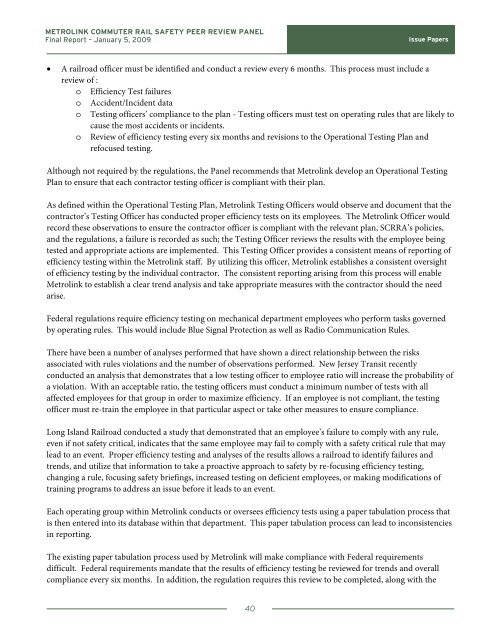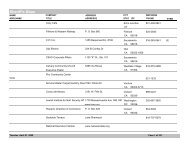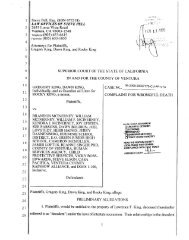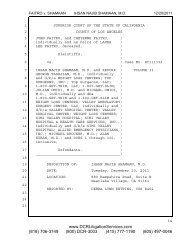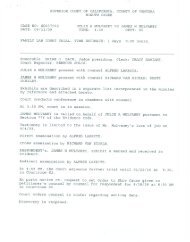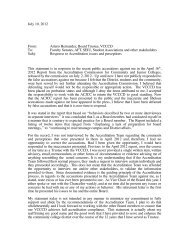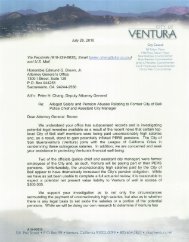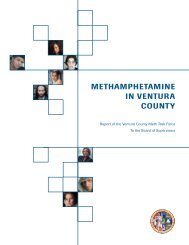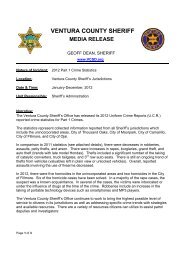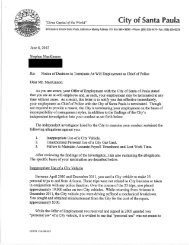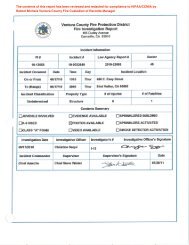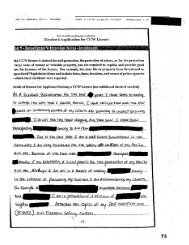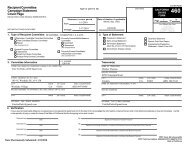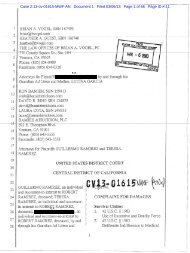Metrolink peer review report - Ventura County Star
Metrolink peer review report - Ventura County Star
Metrolink peer review report - Ventura County Star
Create successful ePaper yourself
Turn your PDF publications into a flip-book with our unique Google optimized e-Paper software.
METROLINK COMMUTER RAIL SAFETY PEER REVIEW PANEL<br />
Final Report – January 5, 2009<br />
Issue Papers<br />
• A railroad officer must be identified and conduct a <strong>review</strong> every 6 months. This process must include a<br />
<strong>review</strong> of :<br />
o Efficiency Test failures<br />
o Accident/Incident data<br />
o Testing officers’ compliance to the plan - Testing officers must test on operating rules that are likely to<br />
cause the most accidents or incidents.<br />
o Review of efficiency testing every six months and revisions to the Operational Testing Plan and<br />
refocused testing.<br />
Although not required by the regulations, the Panel recommends that <strong>Metrolink</strong> develop an Operational Testing<br />
Plan to ensure that each contractor testing officer is compliant with their plan.<br />
As defined within the Operational Testing Plan, <strong>Metrolink</strong> Testing Officers would observe and document that the<br />
contractor’s Testing Officer has conducted proper efficiency tests on its employees. The <strong>Metrolink</strong> Officer would<br />
record these observations to ensure the contractor officer is compliant with the relevant plan, SCRRA’s policies,<br />
and the regulations, a failure is recorded as such; the Testing Officer <strong>review</strong>s the results with the employee being<br />
tested and appropriate actions are implemented. This Testing Officer provides a consistent means of <strong>report</strong>ing of<br />
efficiency testing within the <strong>Metrolink</strong> staff. By utilizing this officer, <strong>Metrolink</strong> establishes a consistent oversight<br />
of efficiency testing by the individual contractor. The consistent <strong>report</strong>ing arising from this process will enable<br />
<strong>Metrolink</strong> to establish a clear trend analysis and take appropriate measures with the contractor should the need<br />
arise.<br />
Federal regulations require efficiency testing on mechanical department employees who perform tasks governed<br />
by operating rules. This would include Blue Signal Protection as well as Radio Communication Rules.<br />
There have been a number of analyses performed that have shown a direct relationship between the risks<br />
associated with rules violations and the number of observations performed. New Jersey Transit recently<br />
conducted an analysis that demonstrates that a low testing officer to employee ratio will increase the probability of<br />
a violation. With an acceptable ratio, the testing officers must conduct a minimum number of tests with all<br />
affected employees for that group in order to maximize efficiency. If an employee is not compliant, the testing<br />
officer must re-train the employee in that particular aspect or take other measures to ensure compliance.<br />
Long Island Railroad conducted a study that demonstrated that an employee’s failure to comply with any rule,<br />
even if not safety critical, indicates that the same employee may fail to comply with a safety critical rule that may<br />
lead to an event. Proper efficiency testing and analyses of the results allows a railroad to identify failures and<br />
trends, and utilize that information to take a proactive approach to safety by re-focusing efficiency testing,<br />
changing a rule, focusing safety briefings, increased testing on deficient employees, or making modifications of<br />
training programs to address an issue before it leads to an event.<br />
Each operating group within <strong>Metrolink</strong> conducts or oversees efficiency tests using a paper tabulation process that<br />
is then entered into its database within that department. This paper tabulation process can lead to inconsistencies<br />
in <strong>report</strong>ing.<br />
The existing paper tabulation process used by <strong>Metrolink</strong> will make compliance with Federal requirements<br />
difficult. Federal requirements mandate that the results of efficiency testing be <strong>review</strong>ed for trends and overall<br />
compliance every six months. In addition, the regulation requires this <strong>review</strong> to be completed, along with the<br />
40


